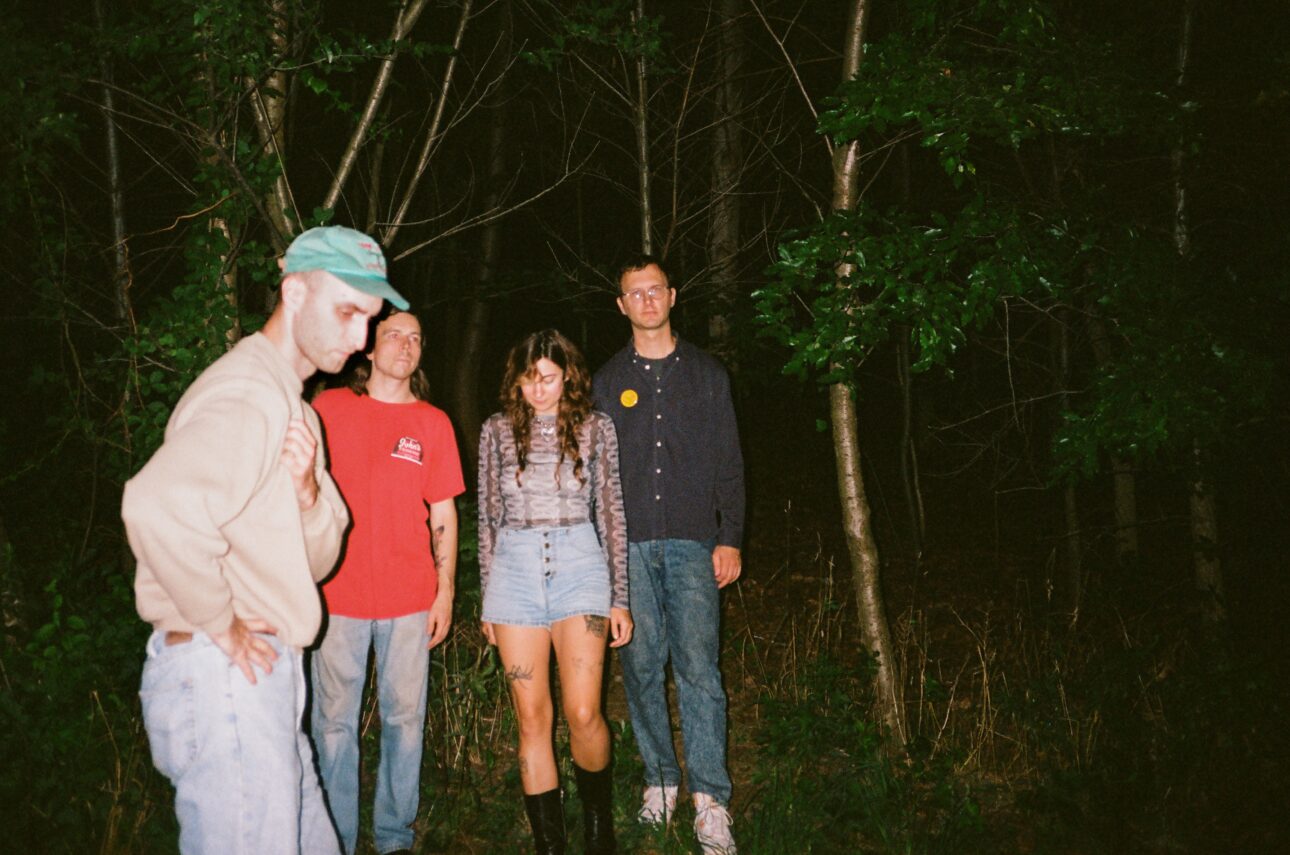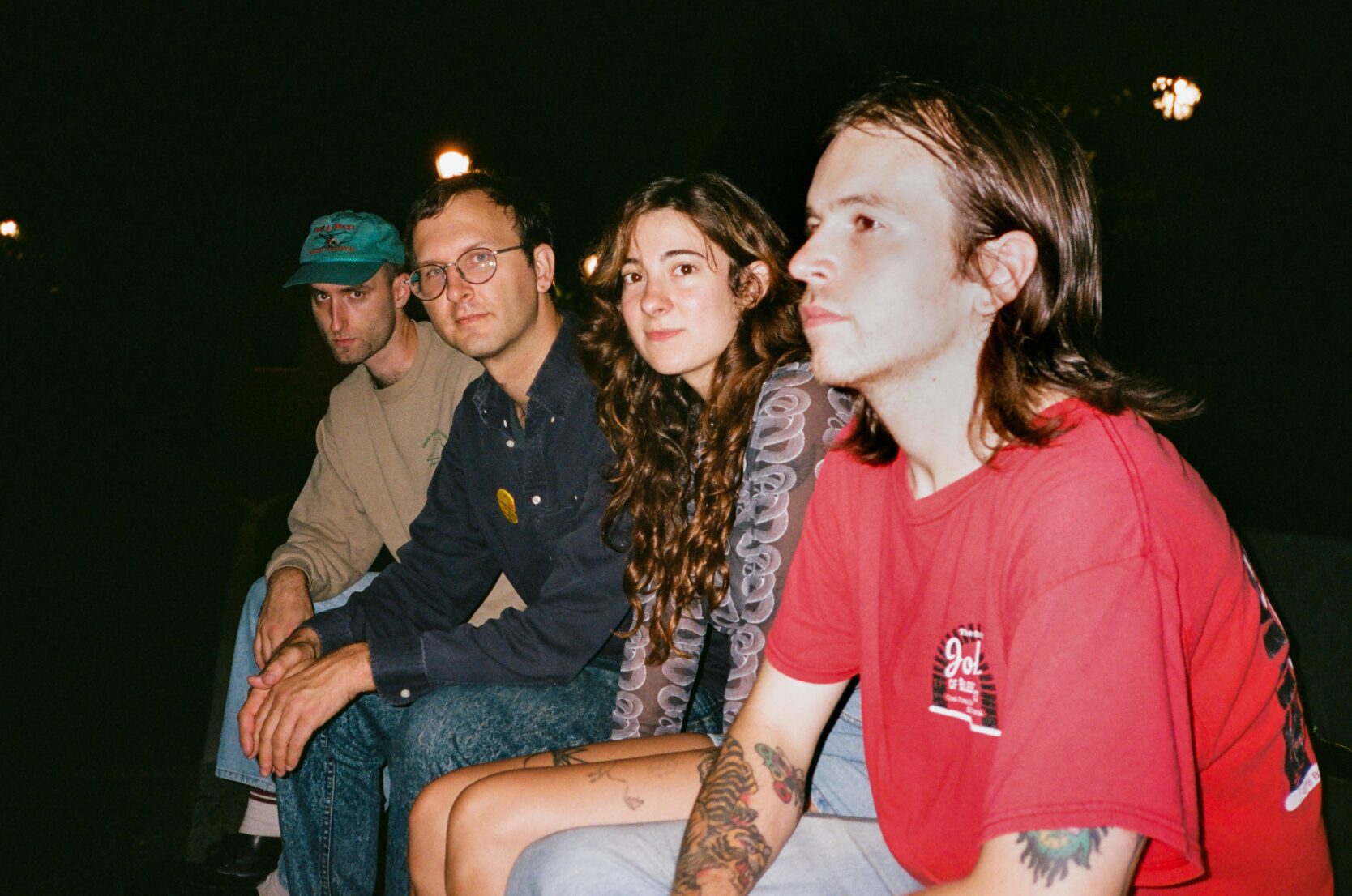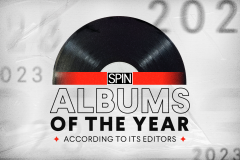When Hotline TNT principal Will Anderson logged onto Zoom with SPIN earlier this month to discuss his band’s 2023 album Cartwheel, he’d woken up in chilly St. Louis but was en route to Louisville, Ky., for their final show of the year. And what a breakthrough it has been: a record deal with Jack White’s Third Man label, praise from nearly every corner of the alt-rock cognoscenti, tours with DIY friends (Sheer Mag) and scene elder statesmen (Quicksand) alike and a firm place alongside Alex G, Wednesday and They Are Gutting a Body of Water amid the umpteenth revival of shoegaze.
While Cartwheel certainly possesses the layered, distorted guitar sound so often associated with the genre popularized in the ’90s by My Bloody Valentine, Slowdive and Lush, it also evinces the vaguely emo, novice making noise in the bedroom-vibes of Anderson’s Minneapolis-adjacent upbringing. Anderson is the first to admit that while his teenage introduction to shoegaze had a formative impact on him, he was just as content to pore through his monthly Guitar World subscription and teach himself whatever songs happened to be transcribed in that issue. “As much as I love My Bloody Valentine, they’re not really a fun band to try and learn the songs,” he says with a laugh.
Before forming Hotline TNT in 2018, Anderson cut his teeth in the not-dissimilar-sounding Weed, which released three albums between 2011 and 2017. With Cartwheel, he says he’s finally been able to translate the varied sounds in his brain into actual music — a process greatly aided by separate sessions with producers Ian Teeple and Aron Kobayashi Rich (Momma’s Household Name). Hotline has also reached fans well outside the indie rock world thanks to Anderson’s NBA zine Association Update and Twitch talk show, which have further broken down the walls between performer and fan.
Below, Anderson filled us in on the response to Cartwheel, his initial reservations about Third Man and the merits of individual Mario Kart characters.

SPIN: The word ‘shoegaze’ has probably come up in every piece about Hotline TNT, so I have to ask: what is your personal journey with this music? Do you feel it’s even a relevant description of what you’re making?
Will Anderson: I think ‘shoegaze’ is now kind of similar to what the word ‘indie’ became like 10, 20 years ago. It doesn’t describe a genre anymore. It’s more of a large umbrella for guitar-based music, or music with distorted guitars. Sometimes they’re kind of bendy or going in and out of tune a little bit. Sometimes the vocals have a little more reverb, but that doesn’t describe Hotline necessarily. I think lo-fi is a term that’s also losing its meaning, but it’s fine. It’s just the way language works and trends work. To go back to the beginning, I had a pretty typical journey myself of hearing Loveless by My Bloody Valentine when I was in 10th grade. It had a pretty big effect on me, as it did with many other people. A couple of years after that, I started making my own music and that was one of the big influences on it.
Whatever they call it, it’s very heartening to me to see younger people becoming interested in guitar-based music. I’m thinking of the resurgence of a band like Slowdive, which broke up in 1995 but is now bigger than ever.
I can’t not mention TikTok in this conversation. A lot of bands are having weird moments like Slowdive and Drop Nineteens, because it’s moody, cool, lo-fi-produced guitar music that fits this aesthetic of these clips that go viral. It’s no different than a show like The O.C. having a song where everyone’s like, ‘Oh, this is a really cool show. And what’s this music playing? I want to hear more of it.’ I think it’s a similar phenomenon. We’ve all seen it happen with super random bands. I don’t want to call them random, but, unexpected for that younger age group. The other thing I would just say is: Alex G. I think Alex G started something as far as a resurgence in guitar music. It wasn’t immediate. Alex has been putting out records for years, but it was a slow build and it’s still at fever pitch, in my opinion. He spearheaded a whole scene of people who were rocking with lo-fi and guitar music and home recording and all that. I could talk for hours about it.
With Cartwheel out in the world, how are you feeling about this body of work with the benefit of a month’s worth of perspective?
The response to this record has been unlike anything I’ve ever put out. It would be disingenuous for me to say, ‘Oh, yeah, moving on to the next record.’ Big moments, or moments where you should take stock and appreciate how far things have come, are often wasted. People don’t do that enough, I don’t think. I feel lucky that I have people around me who have encouraged me to realize that this is really cool. This is not normal.
What was your process like in working with two different producers?
Aron was a wizard. I love the way the Momma album turned out and I definitely wanted his fingerprints on it because of that. The difference between the two is that with Ian, we spent a little more time in the actual songwriting stage. Whereas with Aron, we kind of already had the songs written. His work was more engineering and not as much ‘let’s change the song,’ or, ‘What do you think about adding this part?’ That was more something Ian did, but Aron was like, ‘Let’s just make this fucking huge and get more guitars on here.’ We dug into more of the engineering to get some of those Pumpkins-y tones and synth parts dialed in.
As the music was coming together, what was inspiring you to emote or be creative, lyrically and thematically?
It’s pretty much always relationships, and I don’t necessarily mean romantic all the time. There’s a lot of songs about my parents, my family, my bandmates — former and current — and tons of romance songs throughout my whole body of work. Sometimes I wonder if I should try to write more songs about stuff outside of those kind of petty relationships. There’s no shortage of topics I could wax on, but I leave that political stuff to my day-to-day interactions with people. It just doesn’t feel authentic to bring it into my songwriting, I guess. I honestly don’t think about what I’m writing that much. It just kind of comes out naturally. Maybe that’s selfish. It hasn’t felt appropriate to write, like, a protest song yet.
Was there a piece of gear or a particular guitar that is emblematic of this record? Something that you found yourself using a lot?
I’m sorry to disappoint you and say no. This is a very anti-gear band. [The 2021 album] Nineteen in Love was recorded with no guitar amps and no physical drums. It’s all GarageBand. This album was recorded with Aron and Ian, so they had some more equipment that I didn’t really use. But I think thanks to Ian, we used a lot of 12-string guitars on this album. I think that took it to a place that I want to go even further for the next album, because it hits more of the Teenage Fanclub/jangly side of my influences, but also works in a shoegaze setting, if you want to call it that.
Were any of these tunes workshopped on the road before they appeared on the album?
Yep, definitely. ‘Protocol,’ for sure. We played that one for a long time before I started recording it. To me, ‘Protocol’ is kind of the title track of the album — it’s kind of like the statement song. It’s the closest to what I’ve been trying to do with this band all along, ‘History Channel’ we played for almost a year, but that was also out on a tape version. A lot of songs were written on the spot in the studio. ‘Stump’ was written in one day on the last day of recording with Ian.
Have you had any interactions with Mr. White himself?
Zero interaction. I’ve not been on one email or one phone call. I haven’t gotten a text. Nothing from Jack at all, which is fine. All of us in the band grew up huge White Stripes fans, but that had nothing to do with this relationship.
What were some of the things that drew you to that world, if not him?
Our main A&R person’s name is Camille Augarde. Camille discovered us because we were on tour with another Third Man band in the U.K. called Island of Love. They are my friends, but they’re, like, teenagers. That was their first new band that I was aware of that I thought was cool. I started to pay attention a little bit because I knew Third Man is a big deal operation, but I wasn’t going to take it too seriously just yet. Camille hit me up after the tour. We kept talking, and then we started getting interest from other labels. After we got a booking agent, things just kind of naturally started heating up a little bit. We did the tour with Snail Mail. Other labels hit me up, most of whom I had even less interest in. Camille wrote me and said, ‘Do you have any new demos for the next record?’ And I was like, ‘Actually, yeah, I do.’ I sent her a handful of demos and she was like, ‘I love these. Can we talk about this more?’ Then I heard that Sheer Mag was signing with Third Man, and that changed everything for me.
I’m friends with them. They told every label to go fuck themselves and eat shit. It wasn’t even no — it was like, ‘Fuck you,’ and ‘No.’ Sheer Mag was kind of a template for me as far as how I operate in the music industry. I loved how they were self-releasing everything and self-booking. I loved how they were the most punk band you could think of, but they didn’t sound like punk music.
Well, Nirvana probably wouldn’t have signed to Geffen without Sonic Youth, so this kind of thing is part of the deal.
Exactly. I love Sheer Mag and I wanted to be associated with them. I mean, we were already playing shows together, so it wasn’t a huge leap. Eventually, we retained a lawyer who was going over every contract we got. He looked at every label offer and told us, Third Man’s is easily the best deal. Camille and I were both kind of taking a chance on each other. We didn’t know if Hotline was going to translate to a bigger audience, and I didn’t know if people were going to take a record from Jack White’s label as anything serious beyond like, this is Jack White’s label, you know? We’re both pretty happy with the results, but it was a risk.
Hotline just played some shows with Quicksand. True or false: Walter Schreifels is aging in reverse.
He looks great and he’s totally in shape. I didn’t know him before this tour, and I was only tangentially familiar with Quicksand’s work. Those guys are bringing it every night and they sound great. That was a fun tour. The rooms were full. It was awesome.
You’ve talked in interviews about how playing Mario Kart with friends on Twitch was one of the things that got you through the pandemic. Can you settle the age-old debate: Yoshi for quickness and speed, or Wario for pure brute force?
Well, Wario has more than brute force, I would say. He’s got a chaotic element to him, which I love. My old bandmate in my old band Weed, Kevin, played Yoshi in every single game, so I feel like I kind of have to go Wario. Plus, his name starts with W, so I like him for that reason.
What’s on tap for next year? I presume it’s going to be lots of touring, and maybe there’s even new music percolating already?
I’ve got six songs in the works for the new record. I’m hoping to record whenever there’s downtime, but there’s a lot of touring. Tours I could have never imagined on Nov. 2, the day before the album came out, are now in the mix. I won’t tell you too much more than that, but we’re doing a tour with Wednesday in January and February. That’s the first thing up.
It sounds like there are some other things you can’t announce yet but are very excited about.
Yes (big smile).





